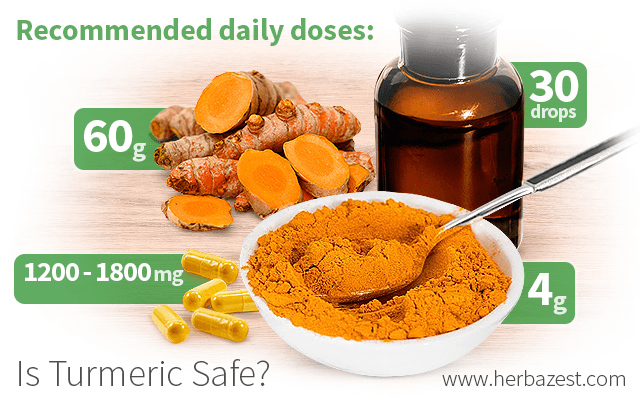In light of the potentially high toxicity of conventional medications used to treat arthritis, diabetes, and irritable bowel syndrome, assessing the overall safety of medicinal herbs has become paramount in recent years. Extensive research and evaluation has led to turmeric being labelled as a safe treatment for pain and inflammation, especially when compared to other drugs.
How Much Turmeric Could Be Toxic?
Countless studies have been conducted to assess the safety of turmeric consumption for both human and animal subjects. Their primary findings point to turmeric as a safe, non-habit-forming herb with minimal toxicity.
A dose escalation study published in BMC Complementary and Alternative Medicine (2006) determined that one-time overdoses of turmeric were generally well-tolerated by patients who received as much as 12,000 mg of curcumin extract at once.1
Nevertheless, extended use of turmeric in high doses has been known to increase the risk of side effects and adverse reactions, such as abdominal pain, nausea, and diarrhea. Such was the case in one clinical trial (Cancer Prevention Research, 2011) where patients treated with eight grams of curcumin a day for two weeks reported pain and discomfort.2
The Safest Ways of Consuming Turmeric
Adhering to the recommended daily doses of turmeric is the safest way to consume the herb:
- A daily dose of 1200 - 1800 mg of turmeric capsules will be enough to enjoy turmeric's health benefits.
- As much as 60 grams of fresh, raw turmeric and four grams of the ground turmeric are well-tolerated. Pairing them with black pepper will help to further potentiate the medicinal properties of culinary turmeric.
- Turmeric oleoresin is also safe and highly effective as a tincture made from 30 drops.
When Is it Not Safe to Take Turmeric?
For many adults, proper therapeutic and culinary use of turmeric is safe; however, medical professionals and their patients should take into account the following health considerations when consuming turmeric:
- Although turmeric has choleretic properties and stimulates bile excretion in the gallbladder, it may not be safe for patients suffering from gallstones or obstruction of the biliary tract.
- Because of its anticoagulant effect, treatments with turmeric should be suspended prior to surgery.
- Turmeric can cause allergic reactions when applied topically.
- Caution should be exercised when combining turmeric with certain other medications, such as anticoagulants, diabetes medicine, and non-steroidal anti-inflammatory drugs (NSAIDs).
- Though safe for culinary consumption, turmeric dietary supplements are not recommended for pregnant and breastfeeding women.
Turmeric's Safety vs. Other Herbs
Turmeric's safety is comparable to that of other anti-inflammatory herbs and spices, such as cayenne, chamomile, rosemary, and sage. As is the case with turmeric, these herbs are mostly safe for daily consumption, but may cause adverse reactions in high doses over long periods of use.
For example, elevated levels of curcumin have been implicated in a number of gastrointestinal upsets, and patients consuming overdoses of sage have experienced seizures, vomiting, vertigo, and kidney damage.
Patients should exercise caution when consuming cayenne, as overconsumption of the herb has been the source of numerous cases of heartburn and diarrhea. Additionally, rosemary has been known to cause uterine bleeding and kidney irritation.
Additionally, each of the above-mentioned herbs may trigger allergic reactions in sensitive patients.
Used as part of a healthy diet and lifestyle, turmeric is a safe and non-toxic treatment for many common illnesses related to pain and inflammation. However, given the potential interactions of this herb, it is recommended to seek the advice of a qualified medical professional before determining how much turmeric is safe to take daily.
Sources
- Clinical Cancer Research, Phase I clinical trial of oral curcumin: biomarkers of systemic activity and compliance, 2004
- Essential Guide to Herbal Safety, pp. 609-612
- Journal of Clinical and Aesthetic Dermatology, Curcumin, A contact allergen, 2015
- Journal of Clinical Pharmacy and Therapeutics, Herbal medication: potential for adverse interactions with analgesic drugs, 2002
- National Institutes of Health, Sage | Chamomile
- Natural Product Communications, Biological studies of turmeric oil, part 3: anti-inflammatory and analgesic properties of turmeric oil and fish oil in comparison with aspirin, 2014
- Medicinal Plants of the World, pp. 118, 200, 276, 283
- University of Maryland Medical Center, Turmeric
Footnotes:
- BMC Complementary and Alternative Medicine. (2006). Dose escalation of a curcuminoid formulation. Retrieved September 23, 2021, from: https://pubmed.ncbi.nlm.nih.gov/16545122/
- Cancer Prevention Research. (2011). Phase II A clinical trial of curcumin for the prevention of colorectal neoplasia. Retrieved September 23, 2021, from:https://www.ncbi.nlm.nih.gov/pmc/articles/PMC4136551/




